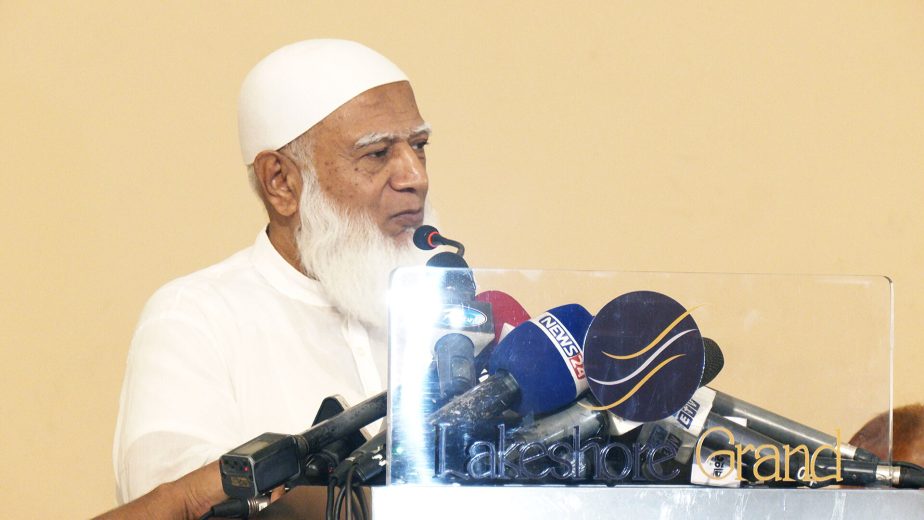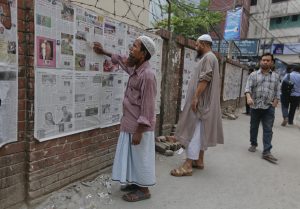Bangladesh’s Jamaat-e-Islami (JeI) party was banned by the Awami League (AL) government on August 1. Four days later, Prime Minister Sheikh Hasina resigned and the AL government collapsed. On August 28, Bangladesh’s interim government lifted the ban on the organization. For decades, the JeI, Bangladesh’s largest Islamist party, has suffered the stigma of collaborating with Pakistan during the 1971 Liberation War. Under Hasina’s 15-year rule, the party suffered repeated onslaughts; its top leaders were executed or jailed for atrocities committed during the war. Thousands of JeI activists have been jailed over the years. Yet the party has not only survived but could well thrive in the coming years.
In an interview with The Diplomat’s South Asia editor Sudha Ramachandran, Shafi Md Mostofa, a Bangladeshi theologian and security studies scholar with broad interests in political Islam, examined the JeI’s strengths and weaknesses as it looks to emerge as an important player in post-Hasina Bangladesh. While it is ideologically strong and has committed activists, its significant street power has not translated into votes so far. The party’s “siding with Pakistan during the war continues to haunt it, affecting its reputation and standing in contemporary Bangladesh.” JeI’s success hinges on “how it addresses this past – whether through seeking an apology or even rebranding the party by changing its name,” Mostofa said.
There has been a significant change in the Bangladesh Jamaat-e-Islami’s fortunes over the past month. Does this reflect a surge in its support from the masses or something else?
Bangladesh Jamaat-e-Islami is one of the oldest Islamist political parties in the country, known for its robust social welfare network and strong organizational structure. Over the past 15 years under Sheikh Hasina’s authoritarian regime, JeI faced significant challenges. Several of its leaders were executed for crimes against humanity committed during the 1971 Liberation War. Its offices nationwide were closed. The JeI and its student wing were banned and labeled as terrorist organizations just four days before the end of Hasina’s rule.
Hasina could have banned the party earlier, citing its collaboration with the Pakistani Army during the 1971 war. She chose not to do so. Instead, she engaged in what can be seen as strategic politics with JeI. By keeping the party alive, she gained both national and international advantages. Nationally, by associating JeI with the Bangladesh Nationalist Party (BNP), she delegitimized BNP’s politics as an anti-liberation force. Internationally, Hasina capitalized on the West’s Islamophobic sentiment, especially since the declaration of the “global war on terror,” by highlighting the growth of JeI. Despite these severe setbacks, JeI has managed to survive, operating clandestinely, which is a testament to the resilience and strength of its ideological foundation.
However, JeI’s survival does not equate to broad-based popular support. In all parliamentary elections, the party’s popular support has consistently remained below 10 percent. This indicates that, while ideologically robust, JeI lacks the mass appeal necessary to significantly influence national elections through sheer voter numbers. Nevertheless, JeI’s strength lies in the composition of its support base. Most of its supporters are not just passive voters but active workers and street activists. This gives the party a visible presence on the streets that belies its limited electoral support. Even though their popular support is less than 10 percent, the mobilization of their supporters in public spaces can create the impression of a much larger following. Therefore, while JeI remains a formidable organizational force within Bangladesh, its influence is more pronounced on the streets than in the ballot box, underscoring the distinction between visible activism and actual electoral power.
Reports suggest that Jamaat activists formed a significant component of the anti-Hasina protestors.
As I mentioned earlier, the supporters of JeI are dedicated activists who have openly backed the recent student movement. Recognizing that all opposition political parties have struggled to remove the authoritarian regime of Sheikh Hasina, they turned to this movement as a critical opportunity to oust her from power. There is no doubt that opposition parties like JeI actively participated in and supported this movement, contributing to its success in challenging the regime. The situation became even more critical for JeI when the party was banned just four days before Hasina resigned. With their political avenues effectively blocked and their leadership under intense pressure, JeI had little choice but to align with the student movement. This alignment was not only a survival strategy but also a means to exert pressure on the regime, ultimately playing a significant role in forcing Hasina to resign.
Could you throw light on the nature of the violence, especially the attacks on statues, in recent weeks? Is JeI associated with it?
Bangladesh recently witnessed a historic moment when a sitting prime minister fled the country amid widespread protests. After her exit, Bangladesh experienced a remarkable period of unrest, during which the police force became non-functional, and the army refrained from declaring a state of emergency. Although the Bangladesh Army remained operational, they were unable to quell the people’s fifteen years of pent-up anger against the authoritarian regime. In a dramatic display of public outrage, citizens across the country burned down Awami League offices and destroyed properties associated with the ruling party. A particularly symbolic act of defiance was the widespread attack on statues of Sheikh Hasina and her father, Sheikh Mujibur Rahman, who was the architect of the liberation war. These acts of vandalism reflected the public’s deep-seated anger towards the regime but also a rejection of what many perceive as the anti-Islamic “statue culture” promoted by the Awami League government.
This convergence of political and religious sentiments created an explosive situation that the authorities were ill-prepared to manage. While it is clear that JeI was involved in these events, they cannot be singled out as the sole perpetrators. The widespread nature of the protests indicates that the anger and frustration were shared across a broad spectrum of society. The attacks on the statues were not just acts of political rebellion but also expressions of religious sentiment, further intensifying the crisis.
The return and rise of the Jamaat-e-Islami is a matter of grave concern to secular Bangladeshis and Indians. Should they be worried?
I don’t subscribe to the notion of Bangladesh as a secular state, as it has never genuinely embodied secularism. Secularism was imposed from above, leading to state policies fluctuating between secularism and Islamism. My research has shown that the inclusion of secularism has, in fact, fueled Islamist forces, strengthening their narrative and pushing them toward transforming the country into an Islamic State. Instead of secularism, I would advocate for Bangladesh to embrace multiculturalism, which would ensure the coexistence of all faiths and ideas in a more inclusive manner.
Addressing your question, JeI is actively safeguarding the houses and worship places of minorities. Some might view this as an opportunistic move by JeI, but the positive aspect is that they are still operating within a democratic framework. As long as they remain committed to democratic principles, I don’t see a reason for concern about JeI’s activities. It’s also important to remember that Bangladesh’s liberal forces are strong enough to maintain a balance in the country, ensuring that no single group can dominate the political landscape.
Is the Jamaat of 2024 different from the Jamaat of 1971?
JeI has made several historical missteps that have shaped its complex legacy. One significant mistake occurred in 1947 when JeI’s founder Maulana Maududi initially opted to remain in India rather than support the creation of Pakistan. Although he later chose to go with Pakistan, his indecisiveness was not well-received.
Another critical error came in 1971 when JeI remained loyal to Pakistan during Bangladesh’s War of Independence, collaborating with Pakistani forces in an attempt to keep East and West Pakistan united. This allegiance led to widespread condemnation and the eventual ban of JeI in Bangladesh.
However, in 2024, JeI aligned itself with the student movement and became part of the new Bangladesh that emerged from this period of unrest. This shift in stance marks a significant departure from its previous positions, as JeI played a proactive role in the aftermath of August 5, which many now appreciate. Their actions included supporting the victims of the movement, holding meetings with like-minded groups, and safeguarding the worship places of minorities. Additionally, JeI has been advocating for the coexistence of all faiths, signaling a commitment to a more inclusive approach.
These activities suggest that JeI is evolving into a different organization—one that is more aligned with democratic principles and the broader aspirations of the Bangladeshi people.

Shafiqur Rahman, amir of the Bangladesh Jamaat-e-Islami. (Wikipedia/Delwar Hossain)
Could you throw light on Jamaat’s links with extremist groups?
While JeI’s direct involvement with extremism is not definitively established, there have been instances of individuals, initially involved with JeI politics, growing disillusioned with the party’s democratic approach to establishing an Islamic State. In two cases that I have researched, these individuals eventually aligned themselves with more militant organizations that advocate for the establishment of an Islamic State through violent means. This phenomenon is not isolated and aligns with observations made by scholars like Olivier Roy. Roy’s work highlights that when organizations fail to provide an effective blueprint for creating an Islamic State through peaceful or democratic means, some members might turn to violence to achieve their goals. The agenda remains the same – the establishment of an Islamic State – but the means shift from political engagement to militant action.
This situation underscores the complex dynamics within Islamist movements, where differing views on strategy can lead to radicalization and the adoption of violent tactics by those who become frustrated with the perceived ineffectiveness of non-violent methods. It also highlights the challenge organizations like JeI face in balancing their ideological goals with the need to operate within a democratic framework, especially when some of their followers may be inclined towards more extreme measures.
What are the challenges for JeI’s growth in Bangladesh?
The behavior of modern nation-states is largely shaped by three primary factors: majoritarian sentiments, modern Western values, and a narrative constructed to delegitimize the opposition. In Bangladesh, these dynamics have had a profound effect on the political environment and the growth of Islamist movements like JeI. Liberal modern values, which are deeply ingrained in Bangladesh’s civil society, media, and elite circles, act as a significant deterrent to JeI’s growth. These values often conflict with the party’s ideology, limiting its appeal among the broader population. Additionally, the form of Islam practiced in Bangladesh is heavily influenced by Sufi traditions, which emphasize spiritualism and tend to delegitimize political Islam. This further reduces the traction that JeI can gain among religiously devout citizens.
Moreover, the landscape of Islamist politics in Bangladesh is marked by intense competition among various groups. This rivalry dilutes the influence of each group, making it difficult for any one organization, including JeI, to establish a dominant narrative or mobilize significant popular support.
Compounding these challenges is the historical trauma associated with JeI’s opposition to the 1971 Liberation War. The party’s legacy of siding with Pakistan during the war continues to haunt it, affecting its reputation and standing in contemporary Bangladesh. The future success of JeI may hinge on how it addresses this past – whether through seeking an apology or even rebranding the party by changing its name. These steps could be crucial in redefining its identity and appealing to a new generation of Bangladeshis.

































